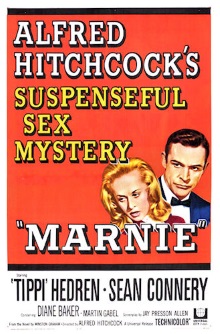
A while back, there was a discussion on Broken Forum about the films of Alfred Hitchcock. After the usual talk of ranking his best films, eventually someone mentioned how Marnie is possibly the most misogynistic film he’d ever watched. When I told my wife this, she became curious and so we added this to our list of films to watch. This one stars Tippi Hedren, who is most famous for The Birds, as the titular character and Sean Connery. I believe that this is the only Hitchcock film in which Connery appears.
“Marnie” Edgar is a beautiful thief who charms her way into employment and then steals from the besotted bosses. She gets in over her head when she targets a publishing company owned by Connery’s Mark Rutland who already knows of her activities. Instead of turning her in however, he hires her and keeps her under close observation. His obsession over her only increases as he learns of her various phobias including fear of the color red and thunderstorms. When she finally makes her move and steals from him, he uses the crime to blackmail her into marrying him. He then sets about reforming her both of her thievery habits and phobias.
Even leaving aside the awful plot, Marnie feels like Hitchcock made it on an off-day. The matte painting backdrop in various scenes look garishly artificial. To show Marnie’s fear of the color red, he tinges the entire screen with it and adds a sound effect, making it look like a B-horror movie. The whole movie looks like a cheap, low-budget production. There are also all kinds of odd missteps, such as when Rutland runs through a cruise ship that is curiously empty when he searches for Marnie. Even the surprise twist that is characteristic of Hitchcock isn’t much of a twist at all. By the end of the film, the audience may not know exactly what happened during Marnie’s childhood that broke her so but can guess enough at the contours of it that the final reveal offers no catharsis at all.
It’s the story however that really forces you to reevaluate the master director. First of all, it is unquestionably misogynistic. Rutland essentially tames the wild but sexually frigid Marnie by forcing her to continually submit to him, up to and including ripping her clothes off and raping her. This was no casual choice on Hitchcock’s part. Screenwriter Evan Hunter claims that he was fired from this movie because he expressed reservations about the rape scene and suggested alternatives. Instead, Hitchcock seemed to take special pleasure in filming that scene in exactly the way he wanted and insisted that the camera close in tightly on the actress’ face at the moment of penetration. Hunter’s replacement as the movie’s screenwriter later told him that he was fired because this scene was the reason why Hitchcock wanted to make this film in the first place.
I should note that the other female characters in the film are also portrayed in a negative light. Marnie’s mother turned out to be a prostitute who worked out of her bedroom at home and yet hypocritically expressed disapproval when she suspected Marnie of getting money from men. Rutland’s sister-in-law Lil has the hots for Rutland himself and engages in all manner of girlishly petty schemes to put Marnie into disgrace. More generally, the theme of beautiful women, typically the ice queen blonde, who turn out to be flawed and wicked and hateful inside is a recurring theme in Hitchcock’s works but Marnie brings the misogyny out in the open. Nor am I a fan of the trite Freudian psychoanalysis to establish Marnie’s personality through her childhood experiences. The whole thing is so poorly made that my wife was convinced that this was made early in Hitchcock’s career when in fact it was the opposite.
As for the acting, my wife commented that Hedren’s performance is better than that of Connery. I’m not sure if this is true. Her character certainly gets put through a wringer so she has more to do. But then she doesn’t have the powerful screen presence of the leading ladies in other Hitchcock movies. There’s more subtlety in Connery’s acting, conveying an impression of Rutland as a creepy man of ambiguous morals who may be just as mentally disturbed as Marnie is.
I wouldn’t say that Marnie is entirely without merit. It’s still a film by Hitchcock and it’s at least watchable, in a darkly fascinating way. But unless you’re compelled to watch every single film made by him, you certainly won’t lose anything by skipping this one.